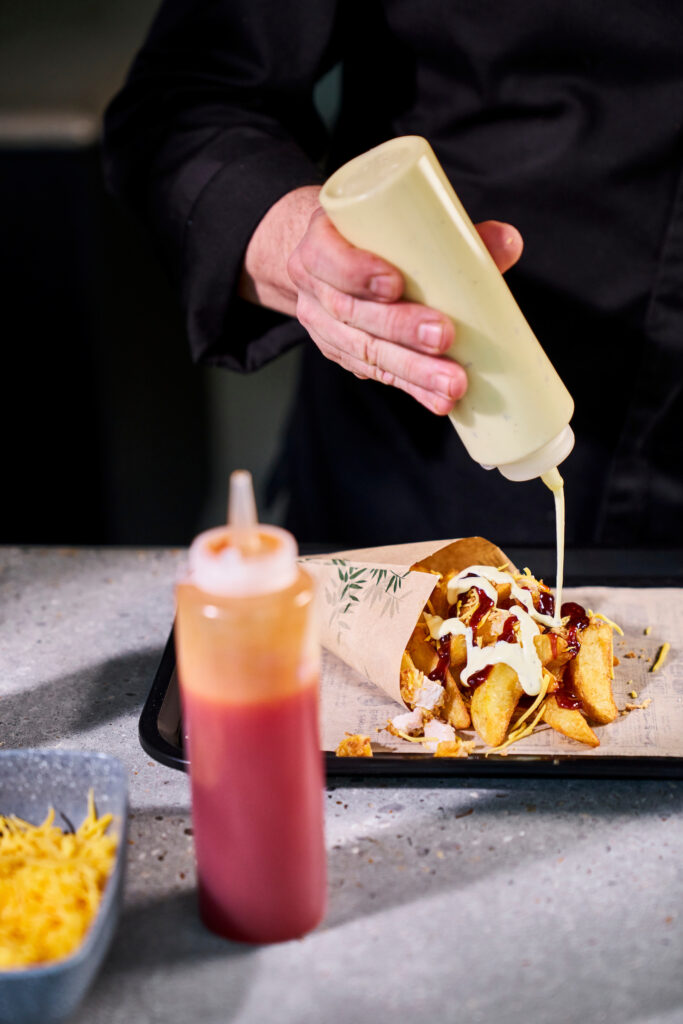Consumers are asking more than ever of quick-service restaurants (QSR). As well as needing to create great tasting food that is quick and convenient, QSR kitchens must now make sure their dishes are good for people and the planet. The focus on health and sustainability is driving fast food companies to seek ways to reduce salt, sugar and fat and incorporate more natural ingredients into their products.
 Individuals have begun to rethink what they want from QSRs as they have become more aware of how personal food choices affect both their own health and the environment. Worldwide obesity has nearly tripled since 1975, with the proportion of adults with a body mass index of 30 or higher increasing from 8.7% in 2000 to 13.1% in 2016.
Individuals have begun to rethink what they want from QSRs as they have become more aware of how personal food choices affect both their own health and the environment. Worldwide obesity has nearly tripled since 1975, with the proportion of adults with a body mass index of 30 or higher increasing from 8.7% in 2000 to 13.1% in 2016.
Consumption of foods that are high in fat, sugar, salt and energy but poor in vitamins and minerals, such as traditional fast-food items, can cause people to gain weight without getting all of the nutrition they need.
The problem is illustrated by an analysis of the salt and fat content of 1,387 pizzas sold in QSR and retail settings in the UK. Half of the pizzas contained at least a day’s worth of salt (6g) and saturated fat (20g). Takeaway pizzas contained more than twice the salt of pizzas sold at supermarkets, on average, and the analysis suggests that QSR salt levels have increased in recent years despite the government pushing to reduce consumption to improve public health.
Consumers are rethinking their buying habits in response to concerns about the health consequences of their dietary choices. Asked by Mintel to rank the health factors that shape the food they buy, European consumers named natural ingredients as their top priority. Low fat content was another top priority.
The toolkit for a new era of fast food
Guided by our promise to contribute to the production of food that is good in every sense of the word, good for people and the planet, we have invested in the capabilities to design customised ingredient solutions that address the health and sustainability concerns associated with fast food without compromising on taste or texture.
 Reduce sugar and fat
Reduce sugar and fat
Sauces such as mayonnaise and ketchup are integral to the QSR experience. Yet, because they are high in energy and sugar, sauces are also a target for consumers who want to reduce their intake of calories.
We have responded to the shifts in consumer demands by developing a range of cold produced stable low-calorie sauces. The sauces contain around 75% fewer calories than traditional full-fat sauces, with the kilocalorie content of Solina’s low-calorie mayo coming in at 29 kcal per 15 grams, compared to 110 kcal for the traditional alternative. Solina uses 75% less sugar in its low-calorie solutions.
The reductions, which were achieved across all iconic sauces were accomplished without compromising on flavour. We have the industrial setup to produce sauces and numerous capabilities to design sauce solutions without using animal products, MSG or gluten, resulting in vegan products with a Nutri-Score of A, for instance.
Reduce salt
Cutting sugar and fat will only partly address concerns with the nutritional properties of fast food. Salt is another key focus for health-conscious consumers. The QSR challenge is to reduce levels of salt, a flavour improver and preservative, without negatively affecting taste and other critical product attributes.
Our sodium reduction solution (Saltwell) enables QSR kitchens to cut sodium levels in processed foods without sacrificing sensory pleasure. The all-natural, organic-certified and low-sodium alternative to salt is extracted from an underground sea in Chile. Owing to the evaporation process, Saltwell contains 35% less sodium than regular salt.
The low-sodium salt facilitates the launch of nutritionally optimised end products, is suitable for all types of applications and is free from the off-taste that affects alternatives created by blending in potassium chloride.
Use more natural ingredients
All efforts to use more natural ingredients in processed foods start with a key question: when consumers say they want more “natural” ingredients, what do they mean? We surveyed European consumers to answer that question. The survey revealed Europeans want foods that are free from artificial ingredients, additives and preservatives. Many consumers said they avoid earring products that contain nitrites.
Building on the findings, we have continued to invest in alternatives to additives and nitrite salt for use in charcuterie products such as cooked ham and salami. The work has equipped us to develop meat products that have the taste, colour and freshness that all buyers expect but are free from the nitrites that many consumers want to avoid. Uses of the nitrite-free meat products include pizza toppings.
Conclusion
Our solutions for cutting the calorie content of sauces, reducing salt levels and using more natural ingredients are part of a broader set of capabilities for advancing the QSR industry’s health and sustainability challenges. Armed with our capabilities, we can lower the salt and fat content of burgers and hot dogs, enrich foods with protein and fibre and otherwise make products healthier and more nutritious.
The extensive portfolio of plant-based, natural and better-for-you options equips us to empower QSR kitchens to get ahead of health and sustainability trends by creating foods that are good for people and the planet.
